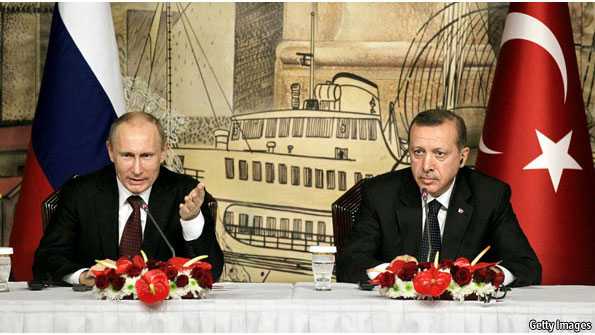“ASSAD is a butcher, Putin a devil, Erdogan a saint,” rasps Mohammed Mustafa, a bony Muslim cleric, who endured 13 years of torture in a Syrian jail. He is among the 20,000-plus Syrian refugees sheltering at a camp near the town of Ceylanpinar on the Turkish-Syrian border. “If Russia withdraws its support, Assad will fall in minutes,” claims Ibrahim Jabbali, a Free Syrian Army rebel.

The exchange took place as Vladimir Putin, Russia’s president, arrived in Istanbul on December 3rd for talks with Recep Tayyip Erdogan, the Turkish prime minister (pictured above). Russia is wary of Syria’s Islamists and their pull over its own restive Muslims. It is bent on blocking America and its friends from gaining further ground in the region. It continues to back Syria’s embattled president, Bashar Assad, with cash and weapons.
The Russians have repeatedly blocked more sanctions against Syria in the UN Security Council and are firmly against any international intervention. Turkey is at the forefront of a campaign to overthrow Mr Assad. It has opened its doors to thousands of refugees (135,519 at the last count), and granted haven and the free flow of arms to rebels. Turkey has also been lobbying for the establishment of a buffer zone and humanitarian corridors.
When Syria downed a Turkish fighter jet over the Mediterranean in June some claimed that it had done so with Russian help. Tension increased on October 10th when Turkey intercepted a Syria-bound passenger jet which it said contained Russian-made radar equipment. Russia denied this and claimed that 17 Russians on board had been manhandled by the Turkish authorities. Mr Putin then postponed a planned trip to Turkey.
Yet in the end Mr Putin did come, and even signed 11 different agreements with the Turks. “The level of economic and political relations is such that neither Turkey can forgo Russia, nor Russia Turkey…the future of Assad is nothing,” argued Mehmet Ali Birand, a veteran commentator.
That is an exaggeration, but Russia has become Turkey’s top trading partner. This is mainly in Russia’s favour: the bulk of the transactions are made up of Russian natural-gas sales to Turkey. Next year Russia will start building Turkey’s first nuclear- power plant near the Mediterranean port of Mersin. Turkey has also agreed to let Russia build a second pipeline via the Black Sea to Europe. Russia is the biggest market for Turkish contractors; Turkey is the top destination for Russian tourists. The two countries boast that two-way trade will triple to some $100 billion in the coming years.
On the political front decades of cold- war hostility have given way to a cool pragmatism. Turkey remained pointedly neutral during Russia’s 2008 war against Georgia and has worked hard with the Russians to resolve conflicts in the Balkans.
Meanwhile, Russia seems to have overcome its twitchiness over the deployment of NATO-manned defensive missiles along Turkey’s border with Syria. It says it “understood” Turkey’s security concerns. (Reports that Mr Assad has been shuttling around his chemical weapons have set off alarm bells in Ankara.) And Mr Putin’s assertion in Istanbul that Turkey and Russia “share the same goals in Syria” but “differ on how to get there” is being touted by Turkey as an encouraging sign that the Russians are slowly coming around.
Turkey’s secular opposition CHP party disagrees. “Turkey did not convince Russia nor the other way round,” insists Faruk Logoglu, a CHP deputy and former ambassador to Washington. Russia wants “a phased transition”, which calls for dialogue between the opposition and Mr Assad. Turkey and the opposition rule out any scenario that would allow Mr Assad to remain in place. In truth Russia has not got the clout to get Mr Assad to leave; nor has Turkey to rein in the rebels. The result, concludes Mr Logoglu, is that “the Syrian people continue to die”.
It is not just the Russians who dislike Turkey’s Syrian policy. Even Mr Erdogan’s pious base is airing doubts. In Ceylanpinar Ismail Arslan, the mayor, complains that clashes between the rebels and Mr Assad’s soldiers have turned his town “into a hell.” Like many he believes that had Turkey not sided with the rebels, the war would have been kept away. Tell that to the thousands of Syrians who continue to flock to Turkey. Jamila, a recent arrival, points to her baby. “If it were not for Turkey,” she murmurs, “we would all be dead”.
via Russia and Turkey: Cool pragmatism | The Economist.

Leave a Reply